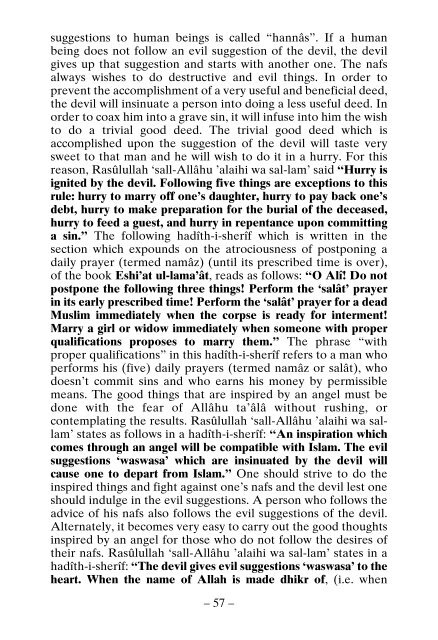Ethics of Islam
Ethics of Islam is taken from the book Berîka by Muhammad Hâdimi. Immorality and ways to get rid of it; 40 depravities and cures to them; usefulness of ethics; what is a soul; strengths of a soul; Personalities emanating from wisdom, courage, chastity and justice are extensively explained.
Ethics of Islam is taken from the book Berîka by Muhammad Hâdimi. Immorality and ways to get rid of it; 40 depravities and cures to them; usefulness of ethics; what is a soul; strengths of a soul; Personalities emanating from wisdom, courage, chastity and justice are extensively explained.
Create successful ePaper yourself
Turn your PDF publications into a flip-book with our unique Google optimized e-Paper software.
suggestions to human beings is called “hannâs”. If a human<br />
being does not follow an evil suggestion <strong>of</strong> the devil, the devil<br />
gives up that suggestion and starts with another one. The nafs<br />
always wishes to do destructive and evil things. In order to<br />
prevent the accomplishment <strong>of</strong> a very useful and beneficial deed,<br />
the devil will insinuate a person into doing a less useful deed. In<br />
order to coax him into a grave sin, it will infuse into him the wish<br />
to do a trivial good deed. The trivial good deed which is<br />
accomplished upon the suggestion <strong>of</strong> the devil will taste very<br />
sweet to that man and he will wish to do it in a hurry. For this<br />
reason, Rasûlullah ‘sall-Allâhu ’alaihi wa sal-lam’ said “Hurry is<br />
ignited by the devil. Following five things are exceptions to this<br />
rule: hurry to marry <strong>of</strong>f one’s daughter, hurry to pay back one’s<br />
debt, hurry to make preparation for the burial <strong>of</strong> the deceased,<br />
hurry to feed a guest, and hurry in repentance upon committing<br />
a sin.” The following hadîth-i-sherîf which is written in the<br />
section which expounds on the atrociousness <strong>of</strong> postponing a<br />
daily prayer (termed namâz) (until its prescribed time is over),<br />
<strong>of</strong> the book Eshi’at ul-lama’ât, reads as follows: “O Alî! Do not<br />
postpone the following three things! Perform the ‘salât’ prayer<br />
in its early prescribed time! Perform the ‘salât’ prayer for a dead<br />
Muslim immediately when the corpse is ready for interment!<br />
Marry a girl or widow immediately when someone with proper<br />
qualifications proposes to marry them.” The phrase “with<br />
proper qualifications” in this hadîth-i-sherîf refers to a man who<br />
performs his (five) daily prayers (termed namâz or salât), who<br />
doesn’t commit sins and who earns his money by permissible<br />
means. The good things that are inspired by an angel must be<br />
done with the fear <strong>of</strong> Allâhu ta’âlâ without rushing, or<br />
contemplating the results. Rasûlullah ‘sall-Allâhu ’alaihi wa sallam’<br />
states as follows in a hadîth-i-sherîf: “An inspiration which<br />
comes through an angel will be compatible with <strong>Islam</strong>. The evil<br />
suggestions ‘waswasa’ which are insinuated by the devil will<br />
cause one to depart from <strong>Islam</strong>.” One should strive to do the<br />
inspired things and fight against one’s nafs and the devil lest one<br />
should indulge in the evil suggestions. A person who follows the<br />
advice <strong>of</strong> his nafs also follows the evil suggestions <strong>of</strong> the devil.<br />
Alternately, it becomes very easy to carry out the good thoughts<br />
inspired by an angel for those who do not follow the desires <strong>of</strong><br />
their nafs. Rasûlullah ‘sall-Allâhu ’alaihi wa sal-lam’ states in a<br />
hadîth-i-sherîf: “The devil gives evil suggestions ‘waswasa’ to the<br />
heart. When the name <strong>of</strong> Allah is made dhikr <strong>of</strong>, (i.e. when<br />
– 57 –

















